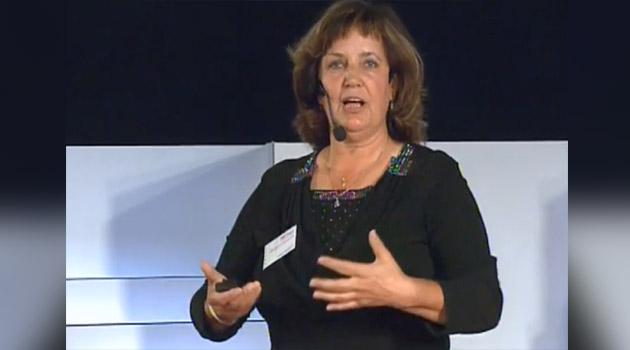Czech Govt Agency for Social Inclusion begins work with mayor who keeps attacking Roma

Representatives of the Czech Government Agency for Social Inclusion and the leadership of the town of Vsetín signed a so-called Memorandum of Collaboration last Wednesday confirming their mutual obligations for the next three years. Local leaders will now collaborate with the Agency within the framework of its “Coordinated Approach” to addressing socially excluded localities.
During that time a local strategic plan for social inclusion should be drafted and approved. Vsetín is one of four localities that were chosen for collaboration as part of the Agency’s “fifth wave” of applications.
The future of Poschla is important
This is the second time that Vsetín has sought to collaborate with the Agency. Its initial application was rejected.
“The first application from Vsetín was good except for one matter – the locality of Poschla. The application did not sufficiently focus on what kind of future awaits its inhabitants,” Agency Director Radek Jiránek explained to news server iDNES.cz.
“Vsetín submitted a statement from the Regional Development Ministry asserting that the overall sustainability period for the Poschla locality is 30 years. The container housing in that locality, therefore, should remain occupied for another 20 years. The Agency, however, believes that type of housing is not appropriate for long-term accommodation. Another problematic aspect related to Poschla is its estrangement from the rest of the town. In its [second] application, Vsetín has pledged to develop a social housing concept in collaboration with experts from the Agency that should reflect existing, modern trends in the area of housing,” Jiránek said when asked by news server Romea.cz to explain the difference between the town’s first application and its second, successful one.
“The town of Vsetín has the option of raising money to implement projects to support social inclusion thanks to its involvement in the Coordinated Approach. Our collaboration will focus primarily on desegregation and on enhancing social cohesion,” said Radka Soukupová, head of the Department of Local Concepts and Social Inclusion at the Agency.
The main common task will be to develop a local social housing concept. “We are counting on the Poschla locality being the subject of our efforts as part of the development of the social housing concept. If the town of Vsetín wants to take advantage of the available resources for investing into its housing fund (the Integrated Regional Operational Programme), or take advantage of non-investment incentives in the area of housing (the Operational Programme Employment), then it must respect the pro-integration principles on which those Operational Programmes are based,” Jiránek told news server Romea.cz.
The Agency is not the only entity that will be assessing the town’s pro-integration focus. Each administration unit that awards EU subsidies to project designs will assess that criterion as well.
Vsetín promised to behave, but Čunek keeps attacking Roma
In order to establish new, pro-integration measures that will be most beneficial, the Agency will perform field research at the beginning of its collaboration with the new locality. The research will aid with mapping the key areas that the town and its partners should focus on when addressing social exclusion.
“The area of how social inclusion is communicated about is coming up more and more frequently as a very important one. We show cities and municipalities, using examples of both bad and good practice, to what degree the various kinds of media coverage of social inclusion influences the decisions they can take,” said Martin Navrátil, head of the Agency’s Eastern Regional Center.
For many years now, media appearances by the Mayor of Vsetín, Jiří Čunek, who at one point even became Deputy Prime Minister, have sparked repugnance among Romani people in the Czech Republic toward him. For example, shortly before deciding to collaborate with the Agency, he told the media that if he proves unable to raise the necessary financing with its aid, he will proceed to evict socially vulnerable people from municipally-owned apartment units.
“We know how to arrange that. However, we don’t want to – we just need the collaboration to be free of prejudice,” the mayor told news server iDNES.cz.
Jiránek rejects these kinds of media appearances. “We do not consider the mayor’s statements appropriate. One component of the memorandum on collaboration is that the municipality pledges to express itself correctly regarding pro-integration processes. Racist and xenophobic statements, and approaches that lead in practice to segregation, will end our collaboration. During last Wednesday’s negotiations the town was thoroughly warned about this point. We believe the Vsetín leaders will refrain from similar remarks and not endanger their collaboration with the Agency and the entire process of social inclusion,” Jiránek told news server Romea.cz.
Čunek, however, attacked Romani people in particular again immediately on Thursday. In an interview for news server TN.cz, the mayor alleged, for example, that Romani children are not accustomed to attending school.
“You have to just force them to do it. What’s more, they don’t have mothers who are able to advise them about the curriculum of even the third or fourth grade,” he said in the interview.
Representatives of the Agency have assured the public that the representatives of Vsetín have now made promises that are supposed to signal their sincerity about social inclusion. Despite those pledges, Čunek is continuing to discuss the excluded Poschla locality as the only possible resolution to the “Romani problem” in his town.
The Agency currently works in 41 socially excluded localities. Its total reach extends to more than 100 cities, municipalities and municipal districts.
New collaborations are announced in so-called “waves”. This summer is expected to see a “sixth wave”.
The Agency is planning to innovate and to announce continually running calls for collaboration that will not have deadlines. Once a total of 70 localities sign up, the calls for collaboration will close.
